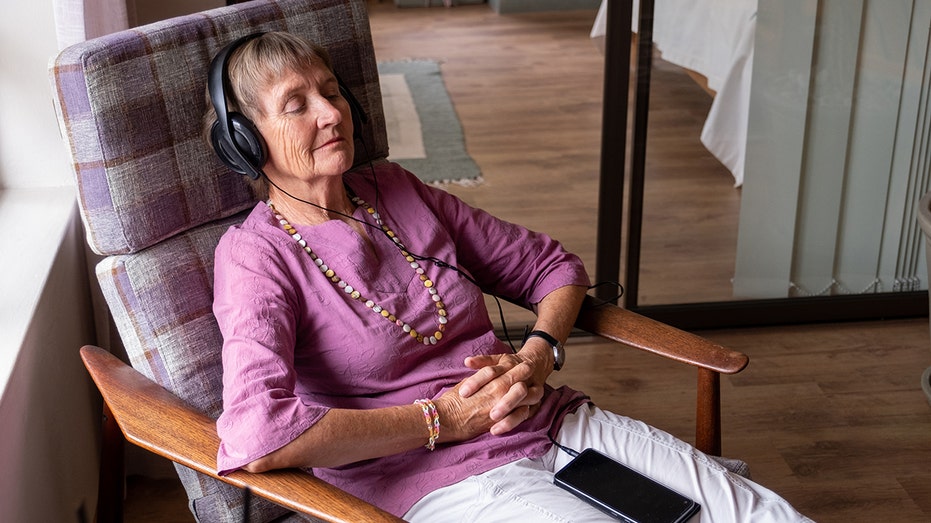Health
Listening to Music May Cut Dementia Risk by 40% for Seniors

A recent study from Monash University in Melbourne, Australia, indicates that listening to or playing music can significantly reduce the risk of dementia in adults aged 70 and older. Findings reveal that those who engage in music regularly are nearly 40% less likely to develop dementia, a group of cognitive disorders characterized by a decline in memory and thinking abilities. The research highlights the potential of music as a protective factor in cognitive health.
According to the study, which was published last month in the International Journal of Geriatric Psychiatry, seniors who consistently listen to music showed a 39% lower risk of dementia, while those who play instruments had a 35% lower risk. The researchers, led by Emma Jaffa and Professor Joanne Ryan, found that involvement in both activities provided an even greater protective effect against cognitive decline.
“With no cure currently available for dementia, identifying strategies to help prevent or delay the onset of the disease is critical,” said Professor Ryan. She emphasized that factors influencing brain aging extend beyond age and genetics, highlighting the importance of environmental and lifestyle choices.
The study tracked over 10,800 adults aged 70 and older over several years, assessing their music listening and playing habits. The results indicated that engaging in both activities not only reduced the risk of dementia but also lowered the risk of mild cognitive impairment—considered less severe than dementia—by 22%. Participants who frequently engaged in musical activities exhibited improved overall cognitive scores and enhanced episodic memory.
Research shows that dementia currently affects around 57 million individuals worldwide, according to the World Health Organization. While the findings suggest that music could serve as a straightforward strategy to help protect cognitive function, the researchers caution that causation cannot be definitively established.
“Music activities may be an accessible strategy for maintaining cognitive health in older adults,” the researchers stated. The effects were particularly pronounced among older adults with higher education levels, specifically those who had completed at least 16 years of schooling. Results for individuals with moderate education levels were mixed.
The implications of this research align with a growing body of evidence indicating that creative and mentally stimulating hobbies—such as music, reading, and art—contribute to brain health in later life. A meta-analysis conducted in 2022 involving studies from the United States and Japan reported similar cognitive benefits for older adults who play musical instruments.
Dr. Morten Scheibye-Knudsen, an associate professor of aging at the University of Copenhagen, acknowledged the positive aspects of mental stimulation but noted that the scientific consensus is not yet settled. “In general, it is advised to train your brain, but the data is actually not that clear,” he stated in an interview. He also highlighted the additional benefits of playing an instrument, including increased social interactions, which are vital as individuals age.
As research continues to explore the relationship between music and cognitive health, the findings from Monash University provide valuable insights into potential strategies for dementia prevention.
-

 Science1 month ago
Science1 month agoNostradamus’ 2026 Predictions: Star Death and Dark Events Loom
-

 Technology2 months ago
Technology2 months agoOpenAI to Implement Age Verification for ChatGPT by December 2025
-

 Technology7 months ago
Technology7 months agoDiscover the Top 10 Calorie Counting Apps of 2025
-

 Health5 months ago
Health5 months agoBella Hadid Shares Health Update After Treatment for Lyme Disease
-

 Health5 months ago
Health5 months agoAnalysts Project Stronger Growth for Apple’s iPhone 17 Lineup
-

 Technology5 months ago
Technology5 months agoElectric Moto Influencer Surronster Arrested in Tijuana
-

 Education5 months ago
Education5 months agoHarvard Secures Court Victory Over Federal Funding Cuts
-

 Health5 months ago
Health5 months agoErin Bates Shares Recovery Update Following Sepsis Complications
-

 Technology6 months ago
Technology6 months agoDiscover How to Reverse Image Search Using ChatGPT Effortlessly
-

 Technology7 months ago
Technology7 months agoMeta Initiates $60B AI Data Center Expansion, Starting in Ohio
-

 Science4 months ago
Science4 months agoStarship V3 Set for 2026 Launch After Successful Final Test of Version 2
-

 Technology7 months ago
Technology7 months agoRecovering a Suspended TikTok Account: A Step-by-Step Guide





















